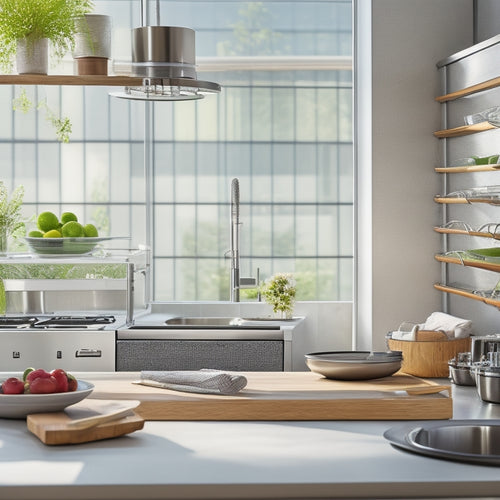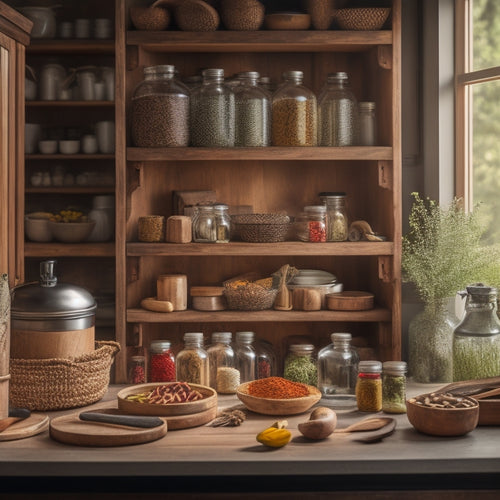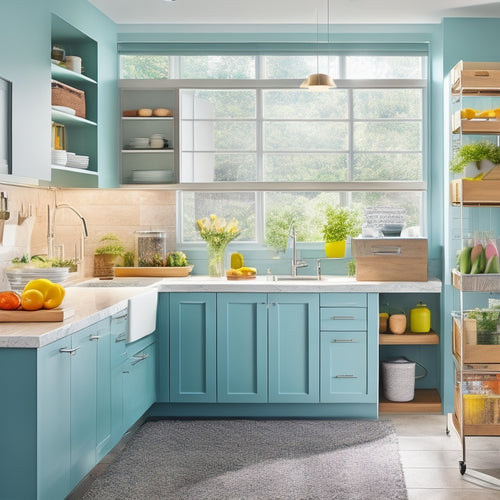
Why Kitchen Clutter Holds You Back From Cooking
Share
You're more likely to order takeout or rely on processed meals when your kitchen is cluttered, as the lack of organization and visual distractions hinder your ability to cook efficiently and enjoy the process. Cluttered kitchens create mental obstacles, increase stress, and make meal prep more challenging. You can't find what you need, and the chaos is overwhelming. By recognizing the consequences of clutter, you'll be motivated to create a more organized space that fosters cooking enthusiasm. Now, discover the solutions you need to transform your kitchen and release your full culinary potential.
Key Takeaways
• Kitchen clutter leads to increased stress and frustration due to the inability to find items, hindering cooking efficiency and enthusiasm.
• Cluttered kitchens discourage cooking by creating mental obstacles, making meal prep a daunting task.
• Visual distractions from clutter reduce meal prep efficiency, leading to longer cooking times and decreased productivity.
• Disorganization in the kitchen sabotages healthy eating habits, as the chaos can lead to relying on convenient, unhealthy meals.
• Cluttered kitchens can negatively impact overall well-being by creating an overwhelming environment that affects mental and physical health.
The Cost of Kitchen Clutter
Cluttered kitchens are costing you time, money, and nutritional well-being, as the chaos and disorganization surrounding you sabotage your cooking efforts and overall health. You're not alone in this struggle, but recognizing the clutter consequences that come with a disorganized kitchen is crucial.
When you can't find what you need, you waste time searching, which leads to increased stress and frustration. This, in turn, affects your mental and physical health, making it more challenging to prepare healthy meals.
Cluttered Kitchens Discourage Cooking
You're less likely to cook when your kitchen is a mess, and the thought of maneuvering through the chaos to prepare a meal becomes overwhelming. Cluttered kitchens create mental obstacles that discourage you from cooking, making it harder to focus on the task at hand.
When your kitchen is cluttered, you're more likely to feel anxious and stressed, which can zap your cooking motivation.
Visual distractions, like dirty dishes or cluttered countertops, can also hinder your meal prep efficiency. You'll spend more time searching for ingredients or utensils, taking away from the time you could be spending on actual cooking.
This can lead to frustration and a lack of enthusiasm for cooking. A cluttered kitchen can make cooking feel like a chore, rather than an enjoyable experience.
Kitchen Storage Solutions Needed
To overcome the obstacles created by a cluttered kitchen, it's time to implement storage solutions that will help you stay organized and focused on cooking. You've already taken the first step by recognizing the impact of clutter on your cooking habits. Now, it's time to take action.
Here are some essential storage solutions to get you started:
-
Assign a home for each item: Use decluttering techniques to categorize and prioritize your kitchen essentials, and then designate a specific spot for each item.
-
Invest in multi-functional furniture: Opt for kitchen carts, islands, or shelves that provide ample storage and counter space.
-
Utilize vertical space: Maximize your kitchen's vertical space by installing shelves, hooks, or a pegboard to store infrequently used items.
-
Choose the right containers: Select storage containers that are airtight, easy to clean, and visually appealing to keep your kitchen organized and clutter-free.
-
Keep frequently used items accessible: Store your most-used items in easy-to-reach locations to save time and reduce frustration.
Maximizing Space in Small Kitchens
Small kitchens demand creative strategies for maximizing every inch of available space, and a well-planned layout is essential for cooking efficiently. You can't afford to waste any space, so it's vital to optimize your kitchen's layout.
Start by identifying areas that can be improved, such as cluttered countertops or narrow walkways. Then, implement organizing tips like assigning a home for each item, using vertical storage, and installing shelves or hooks to keep frequently used items within easy reach.
Next, apply storage hacks like using baskets, bins, or containers to store dry goods, spices, or cooking utensils. Consider space-saving ideas like a wall-mounted pot rack, a foldable kitchen island, or a compact refrigerator.
Decluttering strategies, such as regularly cleaning out your pantry or fridge, will also help you stay focused on cooking. By implementing these strategies, you'll be able to navigate your kitchen with ease, freeing up more time and energy to create delicious meals for yourself and others.
Streamlining Your Cooking Routine
By streamlining your cooking routine, you'll eliminate unnecessary steps and free up mental energy to focus on the creative aspects of cooking. This means you'll have more time to experiment with new recipes and ingredients, and actually enjoy the process of cooking for yourself and others.
Here are some ways to streamline your cooking routine:
-
Simplify meal prep: Plan your meals for the week, make a grocery list, and prep ingredients in advance to save time during meal prep.
-
Establish a kitchen organization system: Assign a home for each kitchen tool and ingredient, making it easy to find what you need when you need it.
-
Create a cooking schedule: Set aside specific days and times for cooking, so you can stay on track and avoid last-minute scrambles.
-
Clean as you go: Wash dishes and clean up messes as you cook, to avoid a big mess at the end of the meal.
-
Use one-pot wonders: Choose recipes that use fewer pots and pans, reducing cleanup time and effort.
Frequently Asked Questions
Can a Cluttered Kitchen Affect My Mental Health and Well-Being?
You're right to wonder if a cluttered kitchen affects your mental health; it can indeed contribute to stress and anxiety. By implementing organization tips and decluttering, you'll experience mental clarity and stress reduction, leading to improved overall well-being.
How Often Should I Clean and Declutter My Kitchen?
You should clean and declutter your kitchen daily, setting aside 10-15 minutes to wipe down surfaces and put away items, and dedicate one hour weekly to deeper organization and storage solutions.
Are Kitchen Organizers Worth the Investment for a Small Kitchen?
You'll find that investing in kitchen organizers is worth it, even for a small kitchen, as they provide space-saving solutions and budget-friendly options to maximize efficiency, making meal prep and cooking a breeze.
Can a Clutter-Free Kitchen Improve My Cooking Skills and Confidence?
You'll be amazed at how a clutter-free kitchen boosts your cooking efficiency and organization, leading to enhanced confidence and refined culinary skills, allowing you to serve others with ease and precision.
How Do I Maintain a Clutter-Free Kitchen With a Large Family?
"Imagine a medieval castle's organized armory; now, apply that logic to your kitchen! You'll maintain a clutter-free space with a large family by implementing clever storage solutions and dedicating time for meal prep, ensuring everyone's needs are met efficiently."
Related Posts
-

Top-Rated Dish Drainers for Kitchen Use
Top-rated dish drainers enhance your kitchen's efficiency and aesthetics. You'll find compact designs that save preci...
-

Revolving Cabinet Organizer Lazy Susan
A revolving cabinet organizer like a Lazy Susan is a transformative solution for your kitchen. It maximizes space and...
-

Sink Storage Solutions for Open-Concept Kitchens
To maximize storage in your open-concept kitchen, focus on clever under-sink solutions and vertical space utilization...


